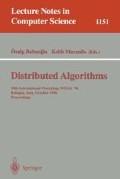Abstract
This paper presents a self-contained study of wait-free solvable tasks. A new necessary and sufficient condition for wait-free solvability is proved, providing a characterization of the wait-free solvable tasks. The necessary condition is used to prove tight bounds on renaming and k-set consensus. The framework is based on topology, but uses only elementary combinatorics, and does not rely on algebraic or geometric arguments.
Supported by grant No. 92-0233 from the United States-Israel Binational Science Foundation (BSF), Jerusalem, Israel, and the fund for the promotion of research in the Technion.
Part of this work was done while visiting the MIT Laboratory for Computer Science, and the Cambridge Research Laboratory of DEC. Supported by CONACyT and DGAPA Projects, UNAM.
Preview
Unable to display preview. Download preview PDF.
References
Hagit Attiya, Nancy Lynch and Nir Shavit, “Are Wait-Free Algorithms Fast?” Journal of the ACM, 41(4), pages 725–763, July 1994.
Hagit Attiya, Amotz Bar-Noy, Danny Dolev, David Peleg, and Rudiger Reischuk, “Renaming in an asynchronous environment,” Journal of the ACM, July 1990.
O. Biran, S. Moran, S. Zaks, “A combinatorial characterization of the distributed 1-solvable tasks,” Journal of Algorithms, 11, pages 420–440, 1990.
E. Borowsky and E. Gafni, “Generalized FLP impossibility result for t-resilient asynchronous computations,” in Proceedings of the 1993 ACM Symposium on Theory of Computing, pages 91–100, 1993.
E. Borowsky and E. Gafni, “Immediate atomic snapshots and fast renaming,” in Proceedings of the 12th Annual ACM Symposium on Principles of Distributed Computing, pages 41–51, 1993.
E. Borowsky and E. Gafni, “The implication of the Borowsky-Gafni simulation on the set consensus hierarchy,” Technical Report 930021, UCLA Computer Science Dept., 1993.
S. Chaudhuri, “More Choices Allow More Faults: Set Consensus Problems in Totally Asynchronous Systems,” Information and Computation, 105 (1), pages 132–158, July 1993.
S. Chaudhuri, M.P. Herlihy, N. Lynch, and M.R. Tuttle, “A tight lower bound for k-set agreement,” in Proceedings of the 34th IEEE Symposium on Foundations of Computer Science, October 1993.
D. Dolev, N. Lynch, S. Pinter, E. Stark and W. Weihl, “Reaching Approximate Agreement in the Presence of Faults,” Journal of the ACM, 33 (3), pages 499–516, 1986.
M. Fischer, N.A. Lynch, and M.S. Paterson, “Impossibility of distributed commit with one faulty process,” Journal of the ACM, 32(2), pages 374–382, 1985.
E. Gafni, E. Koutsoupias, “3-processor tasks are undecidable,” Brief Announcement in Proceedings of the 14-th Annual ACM Symposium on Principles of Distributed Computing, page 271, August 1995.
M. Henle, A Combinatorial Introduction to Topology, Dover Pub, NY, 1994.
M.P. Herlihy, A Tutorial on Algebraic Topology and Distributed Computation, notes for a tutorial presented in UCLA, August 1995. Manuscript dated December 13, 1994.
M.P. Herlihy and S. Rajsbaum, “Set Consensus Using Arbitrary Objects,” in Proceedings of the 13th Annual ACM Symposium on Principles of Distributed Computing, pages 324–333, August 1994.
M.P. Herlihy and S. Rajsbaum, “Algebraic Spans,” in Proceedings of the 14th Annual ACM Symposium on Principles of Distributed Computing, pages 90–99, August 1995.
M.P. Herlihy and S. Rajsbaum, “On the Decidability of Distributed Decision Tasks,” http://www.cs.brown.edu/people/mph/decide.html. Brief Announcement in Proceedings of the 15th Annual ACM Symposium on Principles of Distributed Computing, page 279, May 1996.
M.P. Herlihy and N. Shavit, “The asynchronous computability theorem for t-resilient tasks,” In Proceedings of the 1993 ACM Symposium on Theory of Computing, pages 111–120, May 1993.
M.P. Herlihy and N. Shavit, “A simple constructive computability theorem for wait-free computation,” In Proceedings of the 1994 ACM Symposium on Theory of Computing, May 1994. Full version of [17] and [18] appeared as Brown University Technical Report CS-96-03.
J.R. Munkres, Elements of Algebraic Topology, Addison-Wesley, 1993.
M. Saks and F. Zaharoglou, “Wait-free k-set agreement is impossible: The topology of public knowledge,” In Proceedings of the 1993 ACM Symposium on Theory of Computing, pages 101–110, May 1993.
E.H. Spanier, Algebraic Topology, Springer-Verlag, New York, 1966.
Author information
Authors and Affiliations
Editor information
Rights and permissions
Copyright information
© 1996 Springer-Verlag Berlin Heidelberg
About this paper
Cite this paper
Attiya, H., Rajsbaum, S. (1996). The combinatorial structure of wait-free solvable tasks. In: Babaoğlu, Ö., Marzullo, K. (eds) Distributed Algorithms. WDAG 1996. Lecture Notes in Computer Science, vol 1151. Springer, Berlin, Heidelberg. https://doi.org/10.1007/3-540-61769-8_21
Download citation
DOI: https://doi.org/10.1007/3-540-61769-8_21
Published:
Publisher Name: Springer, Berlin, Heidelberg
Print ISBN: 978-3-540-61769-3
Online ISBN: 978-3-540-70679-3
eBook Packages: Springer Book Archive

